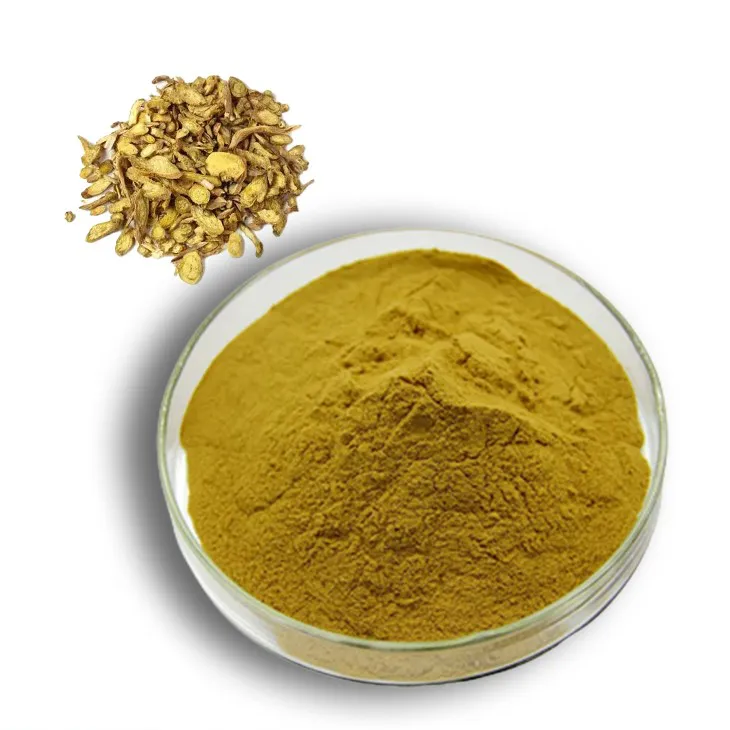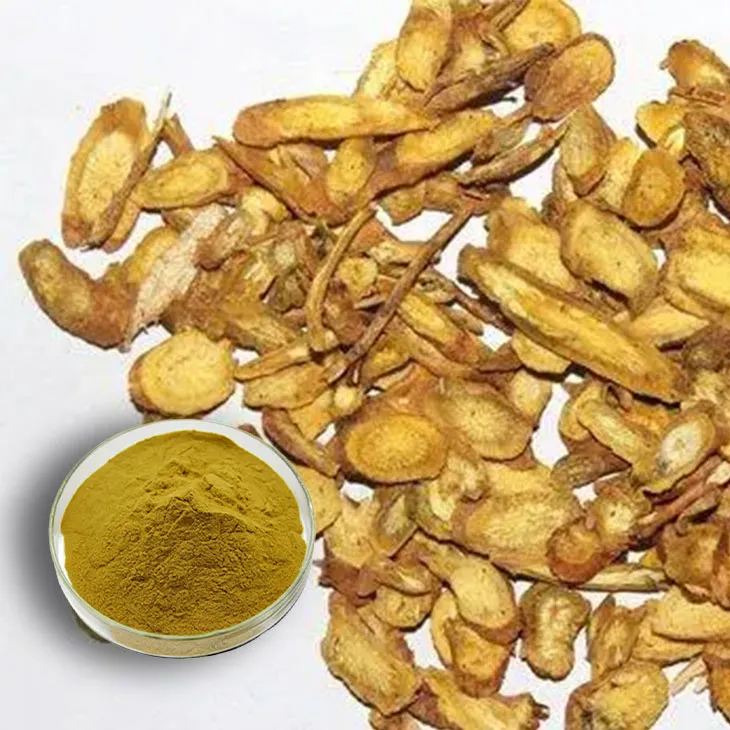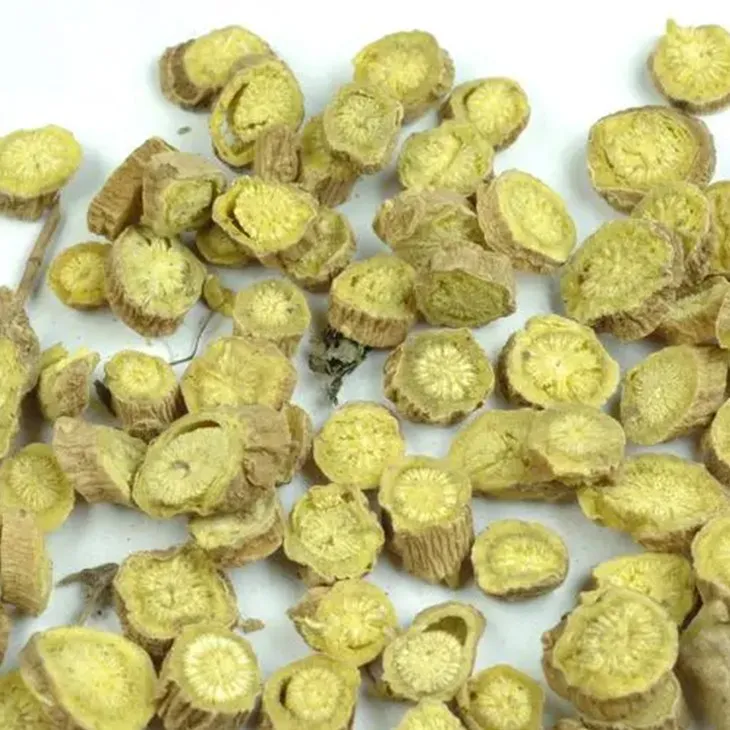- 0086-571-85302990
- sales@greenskybio.com
Five Effects of Baicalin + Dosage and Side Effects.
2024-11-13

I. Introduction
Baicalin, a flavonoid compound, has been drawing increasing attention in the fields of medicine and pharmacology. It is derived from the root of Scutellaria baicalensis Georgi, a traditional Chinese medicinal herb. With a wide range of biological activities, understanding its various efficacies, proper dosage, and potential side effects is of great significance for its effective and safe use.

II. Five Efficacies of Baicalin
1. Antioxidant Activity
Antioxidant Mechanism
Baicalin has strong antioxidant activity, which mainly lies in its ability to scavenge free radicals. Free radicals are highly reactive molecules that can cause oxidative damage to cells, proteins, and DNA. Baicalin can donate hydrogen atoms to these free radicals, thereby neutralizing them and preventing the oxidative chain reaction. For example, in vitro studies have shown that baicalin can effectively scavenge superoxide anions (O₂⁻) and hydroxyl radicals (·OH), which are two common and highly reactive free radicals in the body.
Benefits for the Body
The antioxidant effect of baicalin has numerous benefits for the body. It can protect cells from oxidative stress, which is associated with many age - related diseases such as cardiovascular diseases, neurodegenerative diseases, and cancer. By reducing oxidative damage, baicalin may help maintain the normal function of cells and tissues, and slow down the aging process.
2. Anti - Inflammatory Effect
Inflammatory Response and Baicalin's Intervention
Inflammation is a complex biological response of the body to harmful stimuli. Baicalin can modulate the inflammatory response through multiple pathways. It can inhibit the production of pro - inflammatory cytokines such as interleukin - 1β (IL - 1β), interleukin - 6 (IL - 6), and tumor necrosis factor - α (TNF - α). These cytokines play crucial roles in initiating and amplifying the inflammatory process. For instance, in animal models of inflammation, baicalin treatment has been shown to significantly reduce the levels of these pro - inflammatory cytokines in the inflamed tissues.
Applications in Inflammatory Diseases
Due to its anti - inflammatory properties, baicalin has potential applications in the treatment of various inflammatory diseases. It may be beneficial for diseases such as rheumatoid arthritis, inflammatory bowel diseases (e.g., Crohn's disease and ulcerative colitis), and asthma. In the case of rheumatoid arthritis, baicalin may help reduce joint inflammation and pain by suppressing the inflammatory response in the joints.
3. Antiviral and Antibacterial Capabilities
Antiviral Activity
Baicalin has demonstrated antiviral activity against a variety of viruses. It can interfere with different stages of the viral life cycle. For some viruses, baicalin can inhibit viral attachment and entry into host cells. For example, studies have shown that baicalin can prevent influenza viruses from binding to the sialic acid receptors on the surface of host cells, thereby blocking the initial step of viral infection. Additionally, baicalin may also affect viral replication and assembly inside the host cells, reducing the production of infectious virus particles.
Antibacterial Properties
Regarding antibacterial capabilities, baicalin can act on a range of bacteria. It can disrupt the bacterial cell wall or membrane, leading to the leakage of intracellular components and ultimately bacterial death. Some studies have indicated that baicalin has antibacterial activity against common pathogenic bacteria such as Staphylococcus aureus and Escherichia coli. This antibacterial property makes baicalin a potential candidate for the development of new antibacterial agents, especially in the face of the increasing problem of antibiotic - resistant bacteria.
4. Possible Anticancer Properties
Mechanisms of Anticancer Action
Baicalin may possess anticancer properties through multiple mechanisms. One of the mechanisms is its ability to induce apoptosis in cancer cells. Apoptosis is a programmed cell death process, and abnormal apoptosis is often associated with cancer development. Baicalin can activate the apoptotic pathway in cancer cells, for example, by regulating the expression of apoptotic - related proteins such as caspases. Another mechanism is its potential to inhibit cancer cell proliferation. It can interfere with the cell cycle progression of cancer cells, preventing them from dividing uncontrollably.
Current Research and Limitations
Although there are some promising results in pre - clinical studies regarding the anticancer properties of baicalin, more research is needed. Most of the current studies are in vitro or animal - based experiments. Translating these findings into effective cancer treatments for humans remains a challenge. There are also issues such as the bioavailability of baicalin in the human body and potential side effects in the context of long - term use for cancer treatment that need to be further investigated.
5. Other Potential Efficacies
Besides the above - mentioned major efficacies, baicalin may also have other beneficial effects on the body. For example, it may have a role in protecting the liver. Some studies suggest that baicalin can protect liver cells from damage caused by toxins or drugs, by enhancing the antioxidant defense system in the liver and modulating liver metabolism. Additionally, baicalin may also have a certain impact on the immune system. It may help regulate the immune response, enhancing the body's immunity against pathogens while preventing excessive immune reactions.

III. Dosage of Baicalin
The appropriate dosage of baicalin can vary depending on several factors, such as the purpose of use (e.g., treatment or prevention), the patient's age, body weight, and overall health condition.
Dosage in Traditional Medicine
In traditional Chinese medicine, the dosage of Scutellaria baicalensis Georgi (the source of baicalin) is usually determined according to the principles of traditional medicine theory. For example, in decoctions, the typical amount of Scutellaria baicalensis Georgi used may range from a few grams to tens of grams. However, it should be noted that this is the dosage of the whole herb, and the actual content of baicalin in it may vary.
Dosage in Modern Pharmacological Applications
In modern pharmacological research and clinical applications, the dosage of baicalin is often more precisely determined. In some experimental studies on animals, the dosage of baicalin may be expressed in milligrams per kilogram of body weight (mg/kg). For example, in certain anti - inflammatory studies on mice, the effective dosage of baicalin may be around 50 - 200 mg/kg. When it comes to human use, the dosage is generally much lower and needs to be carefully calculated based on factors such as body weight and the desired therapeutic effect. In some clinical trials, the daily dosage of baicalin for adults may range from a few hundred milligrams to a few grams, usually divided into several doses throughout the day.
Importance of Professional Guidance
Due to the complexity of determining the appropriate dosage of baicalin, it is crucial to seek professional medical advice. Healthcare providers can take into account the individual's specific situation to determine the safest and most effective dosage. Self - adjustment of the dosage without professional guidance can be dangerous and may lead to ineffective treatment or potential adverse effects.

IV. Side Effects of Baicalin
While baicalin has many potential benefits, it is also important to be aware of its possible side effects.
Gastrointestinal Disturbances
One of the common side effects associated with baicalin is gastrointestinal disturbances. This may include symptoms such as nausea, vomiting, abdominal pain, and diarrhea. These symptoms may be more likely to occur when taking high doses of baicalin or in individuals with sensitive gastrointestinal tracts. The exact mechanism underlying these gastrointestinal side effects is not fully understood, but it may be related to the interaction of baicalin with the gastrointestinal mucosa or its effects on gastrointestinal motility.
Allergic Reactions
Allergic reactions to baicalin are relatively rare but can occur. Symptoms of allergic reactions may include skin rashes, itching, swelling, and in severe cases, difficulty breathing or anaphylactic shock. People with a history of allergies, especially those with allergies to plant - based substances, may be more at risk of developing allergic reactions to baicalin. If any signs of an allergic reaction occur during the use of baicalin, its use should be discontinued immediately and appropriate medical treatment should be sought.
Potential Interactions with Other Drugs
Baicalin may interact with other drugs, which can affect the efficacy or safety of both baicalin and the other drugs. For example, it may interact with anticoagulant drugs, potentially increasing the risk of bleeding. Also, when combined with certain immunosuppressive drugs, it may interfere with the normal function of these drugs. Therefore, if a patient is taking other medications, it is essential to inform the healthcare provider before starting baicalin treatment to avoid potential drug - drug interactions.

V. Conclusion
Baicalin is a compound with multiple potential efficacies, including antioxidant, anti - inflammatory, antiviral, antibacterial, and possible anticancer properties. However, to fully realize its benefits and minimize risks, it is crucial to understand its appropriate dosage and be aware of its possible side effects. Further research is still needed to fully explore the potential of baicalin in various fields, especially in the development of new drugs and therapies. In any case, when using baicalin, it is always advisable to follow professional medical advice.
FAQ:
What are the five main effects of baicalin?
Baicalin has antioxidant activity which helps combat free radicals. It also has anti - inflammatory effect reducing inflammation in the body. Its antiviral and antibacterial capabilities can protect against infections, and it may have anticancer properties. Additionally, it can have other beneficial effects on the body's physiological functions.
How is the appropriate dosage of baicalin determined?
The appropriate dosage of baicalin is typically determined by several factors. These include the patient's age, overall health condition, the specific medical condition being treated, and the form in which baicalin is administered (such as tablets, capsules, or liquid extracts). Medical professionals usually follow established medical guidelines and may adjust the dosage based on individual responses during treatment.
What are the common side effects of baicalin?
Some possible side effects of baicalin may include mild gastrointestinal discomfort such as nausea, vomiting, or diarrhea in some individuals. However, these side effects are not very common and may vary from person to person. In rare cases, allergic reactions may occur, which can manifest as skin rashes, itching, or swelling.
Can baicalin be used for treating viral infections?
Yes, baicalin has antiviral capabilities. It can potentially be used in the treatment of certain viral infections. However, it should not be considered as a sole treatment and is usually used in combination with other medical therapies. More research is still needed to fully understand its effectiveness against different viruses and the optimal ways of using it for viral infection treatment.
Is baicalin safe for long - term use?
The safety of long - term use of baicalin has not been fully established. While it may have many beneficial effects, long - term use may carry potential risks such as cumulative side effects or interactions with other medications or substances. It is important to consult a healthcare provider before using baicalin for an extended period.
Related literature
- The Antioxidant and Anti - Inflammatory Properties of Baicalin: A Review"
- "Baicalin: Pharmacological Effects and Therapeutic Applications"
- "Dosage Considerations in Baicalin - Based Therapies"
- "Side Effects Associated with Baicalin: A Comprehensive Analysis"
- ▶ Hesperidin
- ▶ Citrus Bioflavonoids
- ▶ Plant Extract
- ▶ lycopene
- ▶ Diosmin
- ▶ Grape seed extract
- ▶ Sea buckthorn Juice Powder
- ▶ Fruit Juice Powder
- ▶ Hops Extract
- ▶ Artichoke Extract
- ▶ Mushroom extract
- ▶ Astaxanthin
- ▶ Green Tea Extract
- ▶ Curcumin
- ▶ Horse Chestnut Extract
- ▶ Other Product
- ▶ Boswellia Serrata Extract
- ▶ Resveratrol
- ▶ Marigold Extract
- ▶ Grape Leaf Extract
- ▶ New Product
- ▶ Aminolevulinic acid
- ▶ Cranberry Extract
- ▶ Red Yeast Rice
- ▶ Red Wine Extract
-
Calendula Extract
2024-11-13
-
Motherwort Extract
2024-11-13
-
Marigold Extract
2024-11-13
-
Artichoke Extract
2024-11-13
-
Europen Bilberry Extract
2024-11-13
-
Bilberry Extract
2024-11-13
-
Saffron Extract Powder
2024-11-13
-
Dan Shen Root Extract/Salvia Root Extract
2024-11-13
-
Licorice Root Extract Powder
2024-11-13
-
Phellodendron Extract
2024-11-13





















